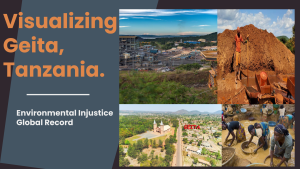Visualizing Geita
xxxx

xxxx

guiding question:
What characterizes grocery stores as COVID-19 workplaces?
meta question:
"Does our clinical practice acknowledge what we already know—namely, that social and environmental forces will limit the effectiveness of our treatments?"
"This means working at multiple levels, from “distal” interventions—performed late in the process, when patients are already sick—to “proximal” interventions—trying to prevent illness through efforts such as vaccination or improved water and housing quality."
"Yet risk has never been determined solely by individual behavior: susceptibility to infection and poor outcomes is aggravated by social factors such as poverty, gender inequality, and racism."
This group works in varying social ecologies therefore requiring it to be very flexible and prepared for the any possible social ecology it may encounter. It can range from sparse medical facilities in Chad in which they have to set up working clinics and shelter for individuals to war-stricken Yemen in which Safe health locations are key to adequate healthcare.
This article discusses the health and living inequalities faced by individuals housed in Rikers correctional facilities. It discusses that when individuals are housed there they live in subpar conditions with very little representation in legislature. The infrastructure is crumbling and residences prone to flooding. It also touches on the life lived by post-incarceration individiuals. The end tells of the hardships faced by those because it leaves them without a steady home, very little financial assistance, and a sense of self destruction.
Artisanal or Snall Scale Mining in Geita.